Montreal trans community reflects on nationwide bigotry
How transphobic marches and rhetoric are weighing on community members
Content warning: this article contains themes of self-harm.
On Sept. 20, Montreal trans activists and allies marched to counter the One Million March for Children (OMMC) protests across Canada.
According to the OMMC, they are committed to “safeguarding the well-being and innocence of children” by opposing the Sexual Orientation and Gender Identity school curriculum, mixed gender bathrooms, pronouns and gender ideology.
For a number of trans people in Montreal, it was the first time they were confronted with such overt anti-trans hate.
Eli Kourtis, a trans woman who witnessed the OMMC walk through the Sir George Williams campus, said it's the first time she's come face to face with transphobia in this way.
"I wasn't expecting how people would just look through me, or leer at me like I was a monster or an animal—something less than human," she said, recalling the protesters walking past Concordia. "The only thing I could do was keep my fist in the air and refuse to let [them] make me afraid. I held onto my queer joy and queer rage with everything I had in me."
Celeste Trianon, a Montreal-based trans activist who organized the pro-trans counter-protest, said she found the situation "extremely scary because it is the first time, to my knowledge, [that] there's been so many anti-trans protesters gathered in the same location. It truly is making me feel fearful for my own safety, dignity and even life."
In response to the protests that overlapped with Concordia and McGill's campuses, McGill sent out an email to its students and faculty. Concordia posted to Instagram expressing solidarity with the LGBTQIA2S+ community.
Many students expressed their disappointment with both McGill and Concordia's responses to the protests on their campuses. "McGill sent out a short 'hope you're good' email and it didn't feel like enough. Stuff like this shouldn't be treated normally, " said Connor Tedeshi, a trans student at McGill. "I was glad the government posted that they didn't support this, but they weren't there to help. [...] I had to sit there and hear these things and be expected to just go on with my day."
Anti-trans sentiments have begun influencing governments around the country. Back in July, New Brunswick amended its Policy 713. The bill would force transgender students under the age of 16 to out themselves to their parents for teachers to use their preferred name and pronouns. Without parental consent, teachers and school staff would not be allowed to use the student's chosen name and pronouns. Saskatchewan also implemented a similar policy.
Saskatchewan Premier Scott Moe announced that he will invoke the notwithstanding clause to force the policy through after the courts blocked it, while New Brunswick Education Minister Bill Hogan doubled down on the policy before the start of the school year. Hogan claimed the review of the policy was triggered by numerous complaints from parents, though none were found when a researcher from the University of New Brunswick filed a freedom of information request.
Both governments' bills state that the student would have access to counselling and support from the school until they are ready to come out to their parents. Until such time, they will be referred to by their given name and pronouns.
Trianon, who also operates a legal clinic to help trans people with name and gender marker changes, believes students with non-affirming parents will get hit the hardest by the laws:
“These policies would force students in these situations to make a life threatening choice," she said, "to either have your very identity denied by the government at school; teachers being compelled to deadname you, to misgender you; or out yourself to your parents at the consequence of potentially becoming homeless. And in more dire circumstances, even illness and death. These are very much possibilities, and they do nothing but endanger trans youth who are the most vulnerable within Canadian society right now."
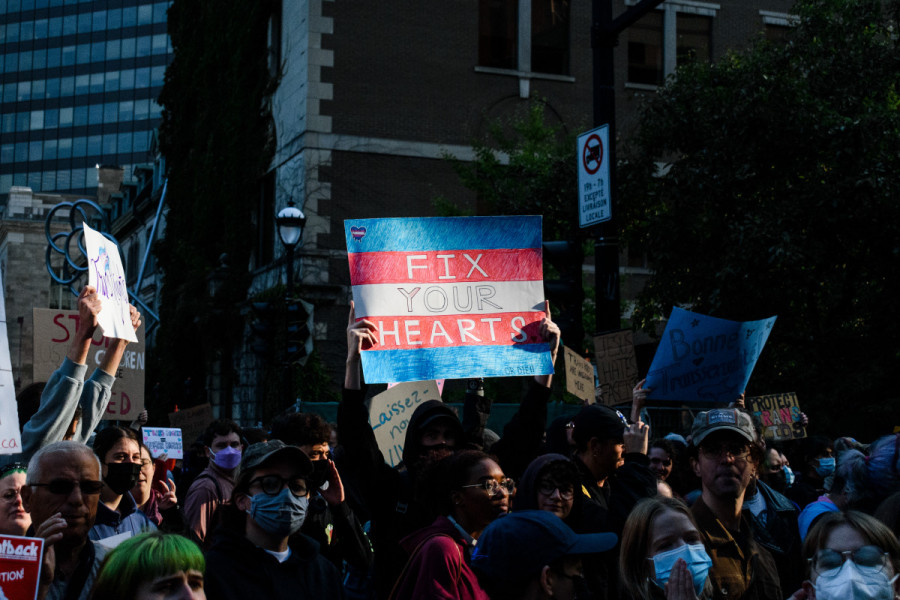
In a statement on its website, the Canadian Paediatric Society explains that trans youth are at a higher risk of depression, anxiety, self-harm and suicide. Trans youth also experience higher levels of harassment and violence.
On the federal level, the Conservative Party of Canada, headed by Pierre Poilievre, voted to prohibit transgender children from accessing gender affirming care. According to a paper titled “Recognizing the Importance of Chest Surgery for Transmasculine Youth” from the American Academy of Pediatrics, these medical interventions are considered part of the standard of care for transgender youth and policies “are manifestations of larger social stigma and transphobia that must be addressed.”
While Quebec hasn't formally introduced any anti-trans legislation, trans people in the province remain on edge. Trianon estimates that the Coalition Avenir Québec (CAQ) government’s responses have been adequate but insufficient, especially during a recent controversy involving a non-binary teacher who wished to use the Mx. title.
Trianon hopes Quebec may become a "refugee haven state" for displaced trans people, but also fears that with growing lobbying efforts from far-right groups, various rights could regress. "Of course, there could be a policy like Policy 713 or worse, even something stricter [...],” she said.
One young trans man, who requested to stay anonymous for his safety, said that the harassment they have received has increased dramatically this year. He spoke about an incident that happened a few weeks prior where he was talking to a stranger and used a masculine adjective when the stranger expected a feminine one.
"He proceeded to ask me what my genitals were, that he did not believe me, that there is nothing I could do that would make him believe that I'm a guy, " they recounted. "This type of shit is why people kill themselves."
He also spoke about how a lot of trans people they knew were very scared. A few days prior to the protest, he received a text from his friend who would be attending the counter-protest that read “if we don’t get hate-crimed we can hang out after this.”
“And like it's funny but it's also not, you know?" he said.
Trianon is also seeing this fear within the trans community. “It's been making a lot of them have more and more distress," she said. "For many people in the community, it's the worst the situation has been probably in at least twenty to thirty years, if not longer."
Despite all of the hatred and the vitriol being thrown at them, the trans community continue to live their lives with a defiant rage.
"I am so, so afraid. But I kept my shaking fist in the air today, and I will every day until either queer people are liberated or I am put into the ground," Kourtis said, "Queer people have always been here—we're in mythology, literature [...] We are not going anywhere."
This article originally appeared in Volume 44, Issue 3, published October 3, 2023.

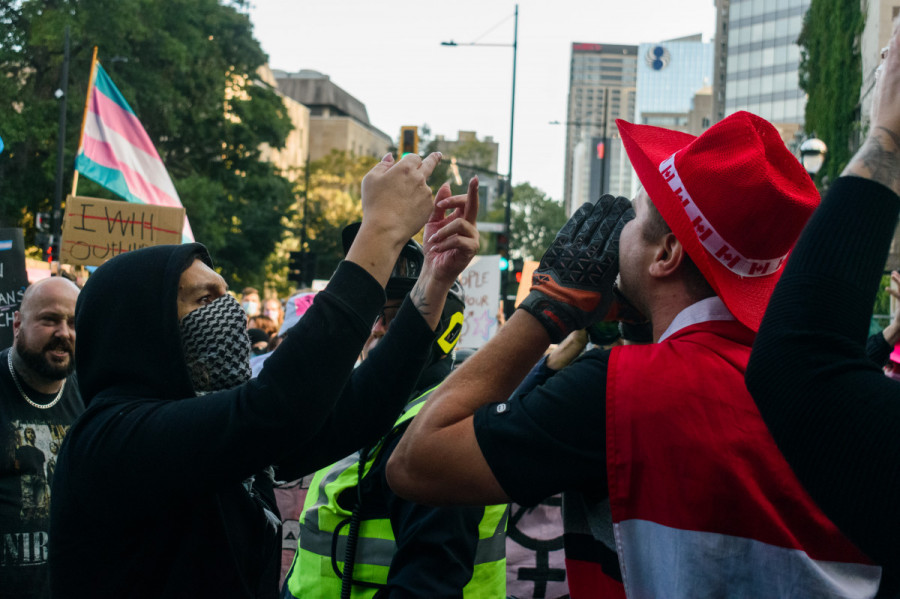


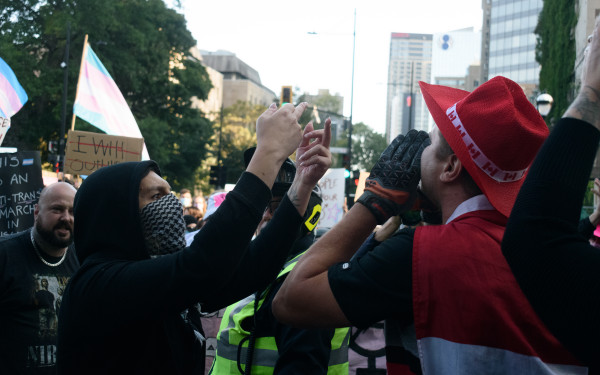
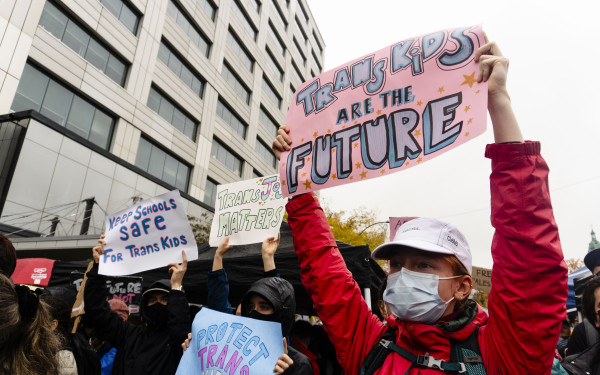
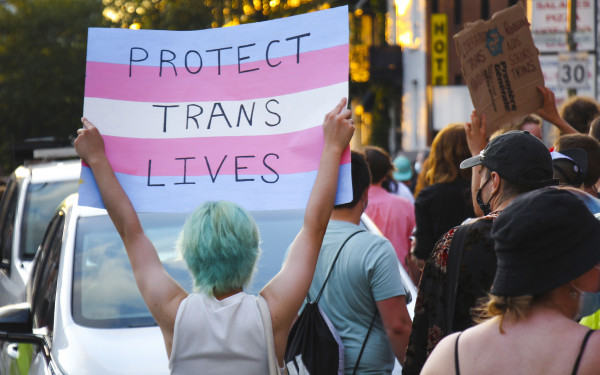
_600_375_90_s_c1.jpg)